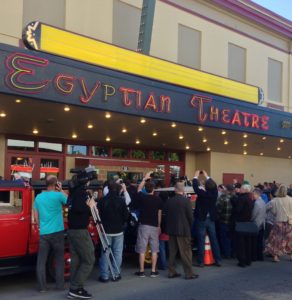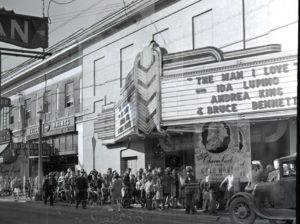The Egyptian Theatre is the cornerstone of the downtown district in Coos Bay.
This unique movie theatre has spanned the eras of silent films, talkies, Technicolor and the modern “blockbuster.” Originally built in 1922 as a garage, the building was remodeled in 1925 into a theatre. Architect Carl F. Berg designed the interior and exterior with Egyptian Revival architecture. The theatre is one of only four known Egyptian Revival movie theatres in the United States and one of the best examples of Egyptian Revival on the West Coast. The theatre includes its original Egyptian style décor, light fixtures, furnishings, hand-painted vaudeville flats and a Wurlitzer pipe organ. In April 2006, the Egyptian Theatre was purchased by the City of Coos Bay when the owners put it up for sale. The City signed a management agreement with the non-profit Egyptian Theatre Preservation Association (EPTA) to manage and operate the theatre. After the March 2011 earthquake/tsunami, City officials determined that the Egyptian Theatre was not safe for occupancy. The Egyptian was closed March 14, 2011 and not scheduled to reopen until after the appropriate repairs were completed. The theatre was nominated to Restore Oregon’s first annual list of Oregon’s Most Endangered Places in 2011. After three years of intense community advocacy, Coos Bay’s beloved Egyptian Theatre shined bright once again.
At the time of its listing as an Endangered Place, the theatre had only a handful of supporters and very few dollars to back-up the vision of a revitalized downtown gathering space. Starting with a feasibility study for the theatre, funded in part by a Restore Oregon Most Endangered Place seed grant, over a million dollars was raised to resolve structural issues, replace failing systems, and provide for critical restoration inside and out in just three years. On June 20, 2014 the ribbons were cut and the Egyptian opened once again. By the end of 2015 the Egyptian Theatre Preservation Association had raised the remaining funds needed to complete the last step of the façade restoration plan. By May 2016 installation of the new canopy, the mounting of the new “ETPA logo” marquee, the refurbishment of the Egyptian head pylon sign, decorative painting at the entrance and above the canopy, and the installation of new display cases with LCD TVs was completed. In 2016, the Egyptian Theatre Preservation Association received a DeMuro Award for Excellence in Preservation, Reuse, and Community Revitalization from Restore Oregon for saving the movie palace and bringing it back to its historic splendor. The ETPA has set the standard for savvy preservation and business planning, with extraordinary community engagement.
Resounding Success and Challenges By 2019, after a long and astounding list of restoration accomplishments, the priority for the ETPA became installing a new roof. With a project cost around $160,000, the organization will now be able to commence with roof replacement with funds from the Historic Revitalization Subgrant, $10,000 from the Henry Lea Hillman, Jr. Foundation, $20,000 from the Coquille Indian Tribe granting foundation, project support from Waste Connections, Inc and the City of Coos Bay and donations of over $12,500 from individuals specifically for the roof project.
The resounding success of the Egyptian carries with it many lessons applicable to community landmarks across Oregon: Commission a feasibility study.
The first strategic step for Egyptian advocates was to prepare a market feasibility study to demonstrate that a revitalized theatre was viable in Coos Bay. Funded by a seed grant from Restore Oregon, it provided credibility for all future fundraising.
Build a “friends of” coalition. Advocates organized under the umbrella of the Egyptian Theatre Preservation Association, a nonprofit through which organization and fundraising could take place. They developed a strategic plan, enlisted skilled board members, and sought training. City staff and volunteers were included every step of the way and the Association made their presence known at fairs, markets, and community events.
Ask for outside help. An initial estimate to reopen the Egyptian came in at $3.7 million, a figure far in excess of what community leaders knew was feasible. Restore Oregon referred advocates to consultants and other regional experts to identify ways to bring the price tag down to a level that was manageable.
Money attracts money. Raising large sums of money in a small community can be daunting, especially if the cost seems insurmountable. Lining up city and grant support early in the fundraising process built confidence among local donors and created a snowball that attracted others and momentum grew.
One bite at a time. Taking a phased approach avoids biting off more than you can chew. While the Egyptian re-opened in 2014, there was still work to be done. Phasing the rehabilitation allowed the theatre to start generating income and helped grow support within the community.
Just for fun:
Theater vs. Theatre – What’s the Difference? Actually, nothing! In most contexts, there is no difference in meaning between theater and theatre. Neither has any special definitions in general usage. The main thing to know is that theater is the preferred spelling in American English, and theatre is preferred virtually everywhere else. We use both in context with the theater/re’s official name.


![]()

